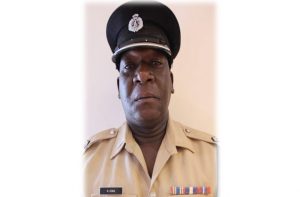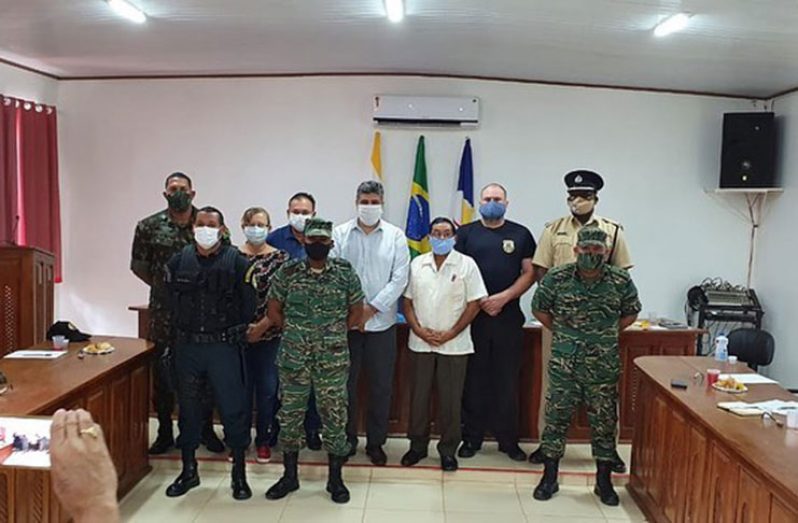GUYANA and Brazil in their respective towns of Lethem and Bonfim, will be setting up a Border Intelligence Committee to respond to acts of illegal border crossings, smuggling and drug trafficking, which pose deadly consequences due to the COVID-19 epidemic.
In an interview with the Guyana Chronicle on Sunday, Region Nine Regional Poilce Commander Superintendent Keithon King and Region Nine Regional Chairman, Bryan Allicock, provided updates on the challenges faced by both towns and the plans to mitigate them.

At Guyana’s end, the team includes the Guyana Defence Force (GDF); the Guyana Police Force (GPF); the Region Nine Regional Chair; the Regional Executive Officer (REO) and health and port representatives. At Brazil’s end in Bonfim, they include the Military Police; the Federal Police; the Army in Bonfim; health authorities and the Mayor of Bonfim.
These authorities last met on Friday, July 24, where specific strategies were discussed. On Sunday, King and Allicock painted a clear picture of the illegalities taking place which are responsible for the COVID-19 cases in the Rupununi.
CRIMINALS USING TECHNOLOGY, BEING ASSISTED
“Persons are mostly coming over [to Guyana]. The problem with the going over [to Brazil] is the smuggling of garlic from Guyana’s shore and the smuggling of the alcohol and other stuff from Brazil’s shore,” the superintendent said, noting that areas in deep South Rupununi have been pinpointed as having a high prevalence.
Meanwhile, the regional chairman stated: “Even though we have had most of the villages locked down, they have the backdoor where they are doing illegal crossing for a fee. People are taking advantage of that. We have seized boats that our people use on this side and we have thrown them in the station compound but, on the Brazilian side, they’re saying that people have boats and when they use them, they take it and hide it.”
Allicock further explained that it is difficult to monitor these activities at the porous Guyana/Brazil border as the Federal Police have reported that the culprits are using “high technology” such as satellite phones, to evade law enforcement.
“They know exactly when our borders are being patrolled, when the Brazillians are patrolling and, when the coast is clear, they contact each other to make their move. It’s a network that is hard to crack, because both sides are involved,” he said.
At the same time, King said that while most villages have constructed gates to monitor or prevent traffic inflows, some within the very villages are working to assist individuals in their illegal activities.
King detailed: “What we found is that the same villagers and the toshaos, they are the persons who are encouraging and transporting their people as well. So, when we get information and we go [to] those villages to query they say ‘no, nobody is really crossing,’ but they are encouraging their own villagers to come and go.”
The superintendent lamented that authorities, along with the Region Nine Task Force, have visited “village after village” to educate residents about the dangers in aiding or abetting such activities, but the challenge, to some extent, still exists.
A CHALLENGE FOR BOTH SIDES
Unfortunately, when it comes to resources, both Bomfin and Lethem face their own challenges with limited law-enforcement members that limit intervention.

“The same challenges that we have, they have it too, which is the lack of resources and manpower,” King said. Meanwhile, Allicock agreed that the GDF in the region is short of a complement of 54 persons within the region, which is why persons from the region are being encouraged to join the force. Allicock said: “We have people who know about the region, who know where these hideouts are, who know where the shortcuts are, who know the backtracking routes.”
Meanwhile, the superintendent pointed out that a working relationship has already been established with the GPF in Lethem and the Federal Police in Bonfim, whereby information is shared. In the past, the two countries have also collaborated whereby GPF ranks were trained in Boa Vista to speak Portuguese to assist with communication. However, Allicock believes that the sharing of information, in light of COVID-19, must become even more persistent.
“What they are [also] doing is taking some aerial patrols with drones and their helicopters. They check along the Takutu River to see if they pick up images of people crossing,” the superintendent said. The regional authorities have since requested that the photographs be sent to the GPF and other local authorities to assist with identifying the individuals.
NO-REOPENING FOR NOW
During the interviews, the Guyana Chronicle was made aware that the President of Brazil, Jair Bolsonaro, has plans to re-openi his country’s borders in September 2020 and this was also discussed at the Friday meeting.
There, Allicock made it clear to the Brazillian officials that when Guyana’s borders re-open at the Region Nine Lethem location is a decision not for the regional authorities, but for the government.
“The Mayor of Bonfim [Joner Chagas] explained to us that even though the federal government wants to open the borders, his state government is not approving and they’re asking to prolong it for another two months. So, we’re hoping that they get through with that,” he said.
Allicock described the meeting for the setting up of the Border Intelligence Committee as “fruitful” and as welcome action by the authorities in Region Nine. The meetings between the stakeholders are usually set up through the Vice Consulate of Brazil in Lethem and more of such are expected in the near future.
In the meantime, the regional chair used the occasion to caution Guyanese who are encouraging illegal crossings and smuggling. He said: “I am pleading with them, everyday actually, to observe the rules and regulations…please adhere to the instructions, the regulation that is meted out by central government as well as the Village Council, be your brothers’ and sisters’ keeper.”



.jpg)










